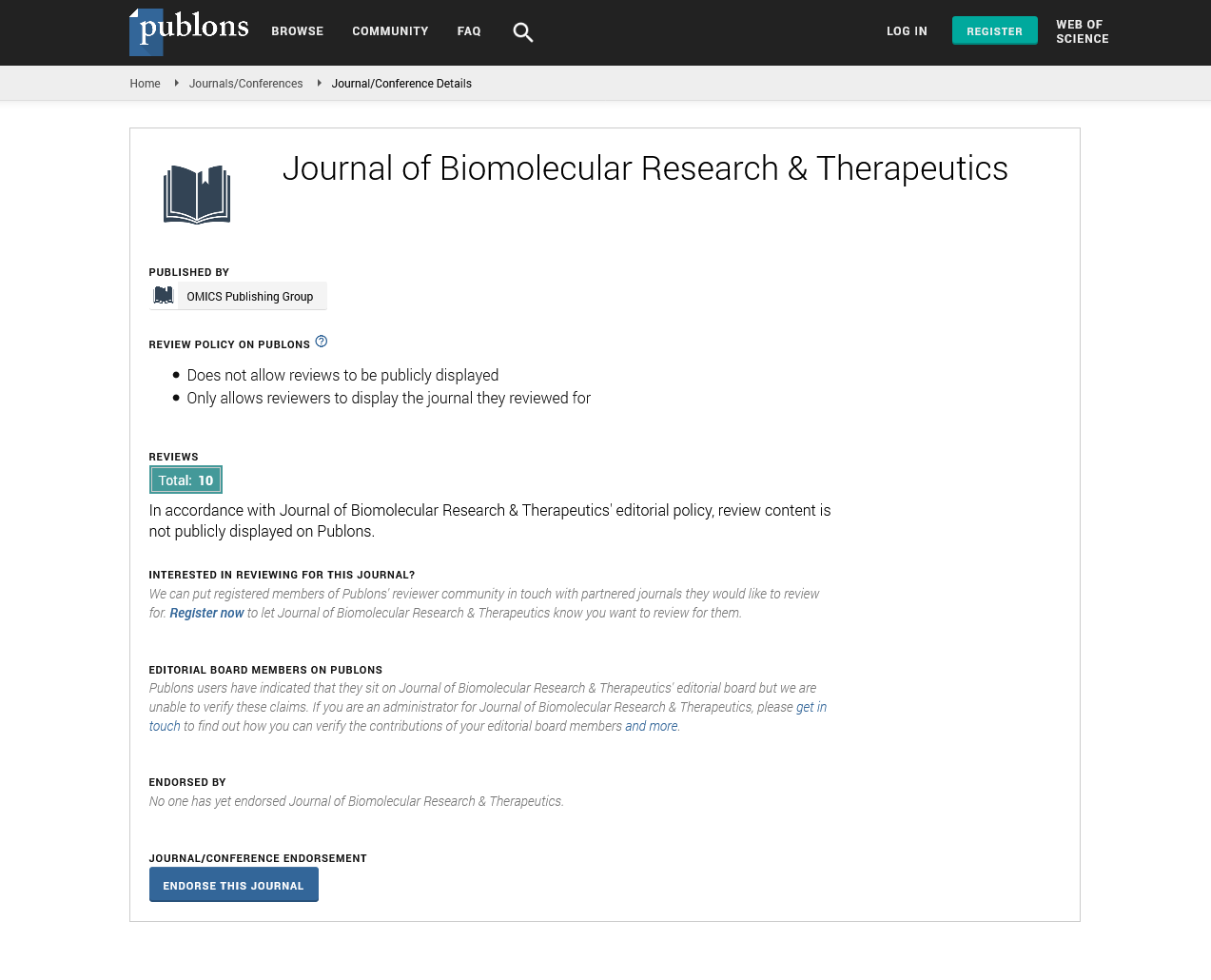Indexed In
- Open J Gate
- Genamics JournalSeek
- ResearchBible
- Electronic Journals Library
- RefSeek
- Hamdard University
- EBSCO A-Z
- OCLC- WorldCat
- SWB online catalog
- Virtual Library of Biology (vifabio)
- Publons
- Euro Pub
- Google Scholar
Useful Links
Share This Page
Journal Flyer

Open Access Journals
- Agri and Aquaculture
- Biochemistry
- Bioinformatics & Systems Biology
- Business & Management
- Chemistry
- Clinical Sciences
- Engineering
- Food & Nutrition
- General Science
- Genetics & Molecular Biology
- Immunology & Microbiology
- Medical Sciences
- Neuroscience & Psychology
- Nursing & Health Care
- Pharmaceutical Sciences
Opinion Article - (2023) Volume 12, Issue 5
Innovations of Drug Development and Delivery in Biomolecules
William Poppy*Received: 10-May-2023, Manuscript No. BOM-23-21509; Editor assigned: 15-May-2023, Pre QC No. BOM-23-21509(PQ); Reviewed: 29-May-2023, QC No. BOM-23-21509; Revised: 06-Jun-2023, Manuscript No. BOM-23-21509(R); Published: 13-Jun-2023, DOI: 10.35248/2167-7956.23.12.295
Description
Drug development is a complex and intricate process that involves the identification, design, synthesis and optimization of compounds with therapeutic potential. Biomolecules play a critical role in this process as they serve as targets for drug discovery, contribute to drug formulation and delivery, and act as therapeutics themselves. It provides an overview of drug development in the context of biomolecules, highlighting key concepts, strategies and advancements in the field. It covers various classes of biomolecules, including proteins, nucleic acids, lipids and carbohydrates and explores their involvement in drug discovery, development and delivery. Additionally the challenges and future prospects in biomolecule-based drug development are discussed. It emphasizes the diverse roles that biomolecules play from being targets for drug action to influencing drug discovery, development, formulation and delivery. The section on biomolecules as drug targets discusses different classes of biomolecules and their relevance in drug discovery. Proteins such as enzymes, receptors and signaling molecules offer numerous therapeutic targets. Nucleic acids including DNA and RNA play a crucial role in gene regulation and can be targeted for therapeutic intervention.
Lipids and carbohydrates through their interactions with proteins and glycoproteins present additional opportunities for drug targeting. The subsequent section explores the role of biomolecules in drug discovery. It covers high-throughput screening methods, rational drug design, structure-based drug discovery, fragment-based drug discovery and combinatorial chemistry techniques. These approaches leverage biomolecular knowledge to identify and design compounds with therapeutic potential. Biomolecule-based therapeutics forms another essential aspect of drug development. Protein-based therapeutics such as monoclonal antibodies, enzymes and cytokines has shown significant success in treating various diseases. Nucleic acid-based therapeutics including antisense oligonucleotides, siRNA and gene therapy offer promising avenues for targeting genetic disorders. Lipid-based therapeutics such as liposomes and lipid nanoparticles enable efficient drug delivery. Carbohydrate-based therapeutics including glycomimetics and glycosaminoglycans hold potential for various applications.The section on biomolecules in drug formulation and delivery discusses different approaches for drug delivery systems targeted drug delivery and controlled-release systems. Nanoparticles, liposomes, micelles, hydrogels and other systems are explored for their ability to enhance drug delivery efficiency, target specific tissues and provide controlled release of drugs. Challenges and future perspectives in biomolecule-based drug development are addressed in the subsequent section. Safety and efficacy considerations overcoming biological barriers personalized medicine, precision drug development and emerging technologies are discussed.
The section on biomolecules as drug targets discusses different classes of biomolecules and their relevance in drug discovery. Proteins, including enzymes, receptors and signaling molecules offer numerous therapeutic targets due to their involvement in various cellular processes and disease pathways. Nucleic acids such as DNA and RNA play a crucial role in gene regulation and can be targeted for therapeutic intervention particularly in the field of gene therapy. Lipids and carbohydrates, through their interactions with proteins and glycoproteins present additional opportunities for drug targeting and modulation of cellular processes. The subsequent section explores the role of biomolecules in drug discovery. It covers various methods and strategies employed to identify and design compounds with therapeutic potential. High-Throughput Screening (HTS) methods allow for the rapid screening of large compound libraries against specific biomolecular targets. Rational drug design and structure-based drug discovery utilize the threedimensional structure of biomolecules to design and optimize drug candidates. Fragment-based drug discovery involves screening and optimization of small molecular fragments that bind to target biomolecules.
Citation: Poppy W (2023) Innovations of Drug Development and Delivery in Biomolecules. J Biol Res Ther. 12:295.
Copyright: © 2023 Poppy W. This is an open access article distributed under the terms of the Creative Commons Attribution License, which permits unrestricted use, distribution, and reproduction in any medium, provided the original author and source are credited.

